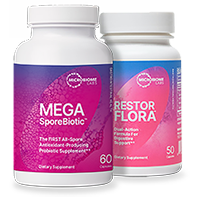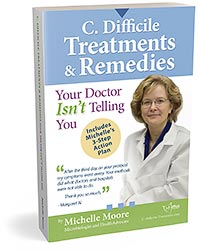 All of the bacteria and other microorganisms or flora living on and inside you make up your microbiome. More than any other part of your body, your microbiome drives your immune system and is the focal point for infections like C. difficile.
All of the bacteria and other microorganisms or flora living on and inside you make up your microbiome. More than any other part of your body, your microbiome drives your immune system and is the focal point for infections like C. difficile.
Did you know that the microbiome begins to form before birth, or that the foundation of the microbiome is built by age 3? The first two years of your baby’s life are when the most dramatic and influential changes happen to the gut flora. And these changes will persist, for better or for worse, for the rest of your child’s life.
There are many things that affect your baby’s microbiome. It all starts with your own health before birth. How you give birth, breastfeeding, how you introduce foods and exposure to antibiotic drugs all play an important role in your baby’s microbiome development 1,2. Below are five key ways to build your baby’s microbiome to support good health for the rest of their lives.
1. Keep Yourself Healthy During Pregnancy
The process of building your baby’s microbiome begins before birth with your own microbiome. Your immune system strength and even your stress level during pregnancy also affect the health of your baby after birth. Even the microbiome of the father plays a potential role in your newborn’s microbiome health.
You pass bacteria from your body to your baby prior to birth. The placenta is one way that your unborn child is exposed to bacteria from your microbiome 3. Bacteria have also been found inside the amniotic fluid during pregnancy 4. There’s also evidence that cell wall deficient “stealth bacteria” may be passed from father to child via sperm 5. Stress during pregnancy can also affect your newborn’s health, increasing the odds of illness and antibiotic use 6. So the healthier you keep your own gut and your immune system during pregnancy, the better your unborn child’s microbiome will be.
2. Vaginal Birth
The newborn is exposed to many bacteria from the mother during the vaginal birth process, seeding the baby’s microbiome. This seeding process does not take place in the same way during a C-section. Therefore, a vaginal birth is preferred to a C-section if possible.
However, several recent studies show that the mom’s health prior to birth and her breastfeeding practices are more important factors than the type of delivery 7,8. Also, the lack of seeding during a C-section can be partly restored by exposing the newborn to the mother’s birth fluid via swabbing 9.
So while opinions vary on the importance of a vaginal birth, there are a few simple steps you can take to get the best results from a C-section. If you must have a C-section, you can ask to expose your baby to birth fluid via a swab. You can also have vaginal fluid placed into the baby’s mouth at birth 10.
3. Breast Feeding
Breastfeeding is one of the best ways to boost your baby’s microbiome and set them up for health later in life. When you breastfeed, prebiotics that support good bacteria and antimicrobials that protect against infections are transferred from you to your baby. You also transfer microorganisms during breastfeeding that seed the microbiome and train the immune system of the infant. Breast milk also contains bioactive compounds that modulate the immune system to help protect the weak and immature immunity of your baby 11.
If for some reason you cannot breastfeed, goat’s milk is a preferred substitute for breast milk rather than using formula. Commercial formulas are popular, but homemade alternatives like goat’s milk are best. Commercial formulas fail to support your baby’s microbiome, immune system and general health as well breast milk 12.
4. Introduce Foods the Right Way
The way you introduce foods can have a dramatic effect of your baby’s microbiome and health. The following tips will help you introduce foods the right way 13:
- Only feed “real” foods. The human body is hardwired to process real foods, not processed foods. If it comes in a box or has a list of ingredients you can’t read, then it’s probably not “real” food. Man-made processed foods are full of artificial chemicals and toxins and lack viable nutrients.
- Start with veggies. The fiber inside veggies helps healthy bacteria to grow. Veggies are also whole and real foods that are packed with vitamins, minerals and other nutrients vital for your baby’s development.
- Next introduce fruit, then meats.
- Don’t introduce grains (cereals) until age 2. The pancreas is not mature until 25 months. This organ releases enzymes that are required to break down grain.
- Minimize toxins, such as sugar, GMO’s, artificial colors and flavors and other processed food ingredients. Use organic produce and products whenever possible.
- Make your own baby food. With homemade baby food you can choose the best and freshest whole food ingredients.
- Postpone peanuts and other nuts until the gut is developed. Peanuts are a high allergy food. If you build your baby’s microbiome properly, it can handle foods like peanuts later on without allergenic reactions.
5. Antibiotic Use and Probiotics
As with adults, antibiotic drugs kill off many of the good bacteria inside your baby’s gut. Because a baby’s microbiome is still developing, childhood antibiotic use can be especially harmful to a child’s long-term health 14. Mothers should also avoid using antibiotic drugs if possible, both during pregnancy and after giving birth. If you use antibiotics while nursing, the drugs can disrupt the microbiome of your baby’s gut 15.
One of the best ways to counter the negative effects of antibiotic drugs is to take a quality probiotic supplement. Probiotics are beneficial for parents and babies alike. Newborns can begin taking and benefiting from probiotic supplements starting at birth 13.
There’s a plethora of information about probiotics and hundreds of different products you can choose from. Check out our probiotics e-course to find out how probiotics work, the limitations of probiotics and which ones I recommend for C. difficile and for microbiome health.

About the Author – Michelle Moore, BSc
Michelle Moore is a microbiologist, holistic health educator, and author of C. difficile Treatments & Remedies. With over 10 years of experience in pharmaceutical research and over 20 years in natural medicine, she helps people overcome C. difficile and other chronic infections naturally.
References
- Building a Healthy Child, Dr. Melina Roberts, ND.
- Factors influencing the composition of the intestinal microbiota in early infancy, Pediatrics. 2006 Aug;118(2):511-21, Penders J1, Thijs C, Vink C, Stelma FF, Snijders B, Kummeling I, van den Brandt PA, Stobberingh EE.
- The Placenta Harbors a Unique Microbiome, Science Translational Medicine, 2014 6(237), Aagaard, K., Ma, J., Antony, K. M., Ganu, R., Petrosino, J., & Versalovic, J.
- PLoS ONE 2008;3:e3056.
- Arch Androl 1995;35:43-7.
- Maternal prenatal anxiety and stress predict infant illnesses and health complaints, Beijers R, Jansen J, Riksen-Walraven M, de Weerth C., Pediatrics 2010;126(2).
- Maturation of the infant microbiome community structure and function across multiple body sites and in relation to mode of delivery, Nature Medicine volume 23, pages 314–326 (2017), D. Chu, J. Ma, A. Prince, K. Antony, M. Seferovic, K. Aagaard.
- Do C-sections alter a baby’s microbiome, hurting later health?, STAT December 5, 2016, Sharon Begley
- Bacteria Critical to Early Immune Development Partly Restored in Infants Born by C-Section, NYU Langone Health PR, Feb 1, 2016.
- Partial restoration of the microbiota of cesarean-born infants via vaginal microbial transfer, Nature Medicine, DOI:10.1038/nm.4039, Dominquez-Bello MG, De Jesus-Laboy KM et el.
- Gut Microbiota and Mucosal Immunity in the Neonate, Med. Sci. 2018, 6(3), 56, Majda Dzidic, Alba Boix-Amorós, Marta Selma-Royo, Alex Mira and Maria Carmen Collado.
- The Influence of Early Infant-Feeding Practices on the Intestinal Microbiome and Body Composition in Infants, Nutr Metab Insights. 2015; 8(Suppl 1): 1–9. A. O’Sullivan, M. Farver, J. Smilowitz.
- Building a Healthy Child, Dr. Melina Roberts, ND., iUniverse rev date 2/12/2016
- Natural history of the infant gut microbiome and impact of antibiotic treatment on bacterial strain diversity and stability. Science Translational Medicine, 2016, Moran Yassour et al.
- The Impact of Antibiotic Use in Breastfeeding Women on the Infant’s Gut Microbiome – A Prospective Cohort Study, IDWeek; October 4–8, 2017; San Diego, CA, Rock R., Ben-Amram H, et el.


 Fill in the form below to get our C. diff. tips newsletter and your free report “10 Things You Need to Know to Overcome C. difficile”.
We value your Privacy. Your email will be kept strictly confidential & secured. See our
Fill in the form below to get our C. diff. tips newsletter and your free report “10 Things You Need to Know to Overcome C. difficile”.
We value your Privacy. Your email will be kept strictly confidential & secured. See our 
